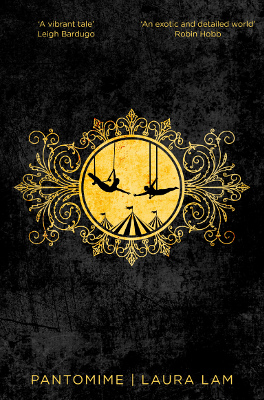 Series: Micah Grey, #1
Series: Micah Grey, #1
First Published: 5th February, 2013
Genre: Young Adult Fantasy / Novel
Available: Amazon.com | Amazon UK
Gene is the daughter of a noble family who has a secret. Micah is a runaway who joins the circus. They’re both the same person, because Gene/Micah is intersex.
There are two timelines in the book. Gene’s starts in the events leading to her running away. Micah’s starts when he visits the circus, and eventually ends up getting a job as a trainee aerialist. Often in stories like this, it’s apparent which name and pronouns are the preferred ones of the person. It isn’t in this case. Both Gene and Micah are identities put on for necessity, and neither is the whole truth. There’s a strong theme of working out how gender roles and sexuality apply. I liked that Micah’s journey was handled as something that wasn’t clear cut and that varied over time, as things like gender and sexuality are not necessarily things that are obvious and set in stone for all people. It did tend to stray into “both male and female” territory, but Micah’s society doesn’t really have a concept of non-binary anything, so it did fit as the best Micah had to describe himself. It reminded me of the ways I’d try to describe myself when I was younger.
The plot was engaging and I enjoyed reading about the circus community. The pacing was mostly there, though I did drift when the pantomime performance began. It’s difficult to make a stage play work in novel format, and I don’t feel this really did it, but it was a short part of the book.
I also liked the world. It’s relatively low tech, but there are devices left from the civilisation of the past. No one knows how they work, so once they run out of power, they can no longer be used. This also links in to a past of other species and human hybrids of various kinds. I had reservations about exactly how this was applied to Micah, but the general idea was good.
There were some areas where it didn’t work for me. A big one is Micah’s presentation as an intersex person. He runs away to avoid invasive surgery designed to make him conform to a binary sex. Micah’s problems are shown sympathetically and it’s clear that forced surgery is not the right choice. The nature of the story means that Micah manages to escape and decide what he wants, which is a positive message. The broad idea wasn’t a bad one, and does cover issues that intersex people can face. But I wasn’t too comfortable with the rest.
I haven’t found many intersex characters in speculative fiction, but where I have, they’re usually a reimagining of what humans would be like if one person could perform all reproductive processes. Technically, this is a form of ovotestes, but this isn’t how it usually looks in real life. Ovotestes doesn’t dictate a certain appearance and doesn’t mean a person can perform all reproductive processes. On the contrary, this would be extremely rare in a human. Speculative fiction usually gets around this with a handwave of magic or genetic engineering. I’m not saying this type of character should never be written, but it does seem like it’s written so often that it becomes the one true representation.
Micah is very much a fantasy intersex character. He belongs to a magical species where everyone is like Micah. This means he is not human and he is not an intersex member of his species. I’ve kept the label, and discussed Micah as belonging to that label, because it’s how he’s usually categorised in book discussions. I also think the character would be of interest to people wanting to look at intersex characters. But it’s not what I was hoping for when I read the book.
There’s an uncomfortable focus on Micah’s body. People would just happen to feel Micah’s genitals or he’d show them to people rather than explaining (and it certainly wasn’t a culture where nakedness among friends would be viewed as commonplace). It felt rather like Micah was on display to the reader. I’d also note that Micah’s concerns for being rejected due to his body don’t extend to empathy for others. Micah is rather negative about the appearance of the woman with a moustache, for example.
The choice of which circus members would be major supporting characters also didn’t sit well. The freakshow characters are there so Micah could feel bad about showing people as freaks, but they didn’t get character development. Tauro in particular stood out to me, because as well as looking a bit like a minotaur, he appears to have a developmental disability of some sort. The acrobats are non-white and don’t speak the same language as Micah, which means they’re not included in anything. The first time they appear, their movements are likened to wolves, which further removes them from being referred to as human.
The people who get the most development are white, with one of Micah’s potential love interests also being from a wealthy background. So there’s a lot of background diversity, but it only tends to come into the foreground when it’s about being QUILTBAG.
Despite all this, I generally enjoyed the book, and thought it had an interesting world and accessible writing style. It’s also still somewhat rare to have a bisexual lead or to look at gender outside of a binary framework. But it didn’t really fit what I was hoping for when it came to having an intersex character, and I wish some of the background characters had been a little less in the background. Note that there are some sexual assault themes, including an implied rape in someone’s backstory, as well as general violence.